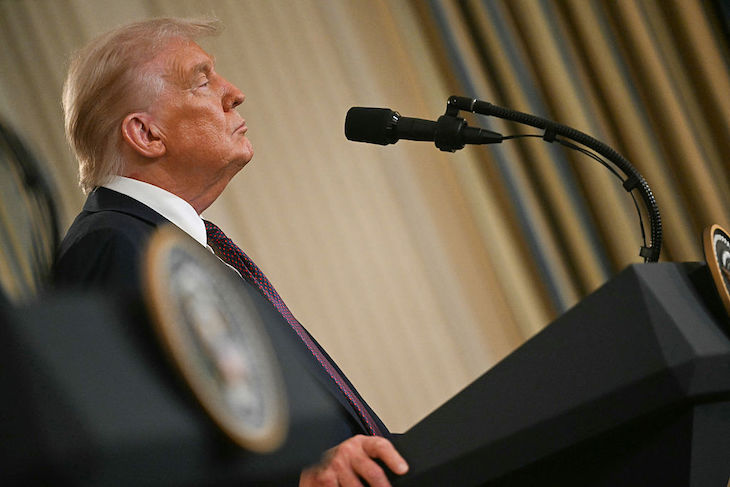In December 2024, Bill Clinton spoke with a candour that history affords. Reflecting on Camp David in 2000, he lamented that ‘you walk away from these once in a lifetime peace opportunities, and you can’t complain twenty-five years later when the doors weren’t all still open, and all the possibilities weren’t still there. You can’t do it.’ His warning was not simply about past missteps but about the nature of political time. Opportunities do not remain static. They decay, they harden, they shrink. To reject an offer once is to ensure that the next will be less generous, more conditional, and more difficult to secure.
It was rejected outright. The Palestinian leadership dismissed it, the factions decried it, and the street treated it as betrayal
That truth frames the contrast between Donald Trump’s 2020 ‘Deal of the Century’ and his current New Gaza plan. The first was comprehensive, a framework for ending the Israeli-Palestinian conflict in its entirety, covering borders, Jerusalem, refugees, and security. It offered the Palestinians not an imaginary French-British-Canadian-Australian-style state in exile but a demilitarised state on the ground, contiguous by high-speed road, with a ten-year economic package of $50 billion (£37 billion), and a four-year timetable to statehood contingent on governance reforms, disarmament of Hamas and Islamic Jihad, and recognition of Israel. It was a deal that, had it been engaged with seriously, could by now have delivered a Palestinian state with prosperity, infrastructure, and international recognition.
Instead, it was rejected outright. The Palestinian leadership dismissed it, the factions decried it, and the street treated it as betrayal. Four years later, instead of statehood, Gaza was engulfed in the most brutal war in its history, started by a Palestinian terrorist army which respects no international norms and laws. Violence consumed the very land that might have been the core of that state. Today the Palestinian people are left with neither a leader who can negotiate nor one who can surrender. They have no figure with the authority to make binding commitments, no institution with the capacity to deliver, and no willingness among factions to subordinate themselves to collective survival. They cling to maximalist demands, blind to the fact that each rejection has cost them something tangible, and that they are rejecting their way into oblivion.
The Gaza plan unveiled by Trump and Netanyahu in 2025 is a direct descendant of the 2020 framework, but it is also a diminished one. The continuities are unmistakable: demilitarisation of Palestinian-controlled territory, the exclusion of Hamas from governance, sequencing tied to benchmarks, and the promise of economic uplift as incentive. Yet the differences speak volumes. The ‘Deal of the Century’ spoke of maps, borders, and a Palestinian capital in East Jerusalem. The Gaza plan says nothing of sovereignty or land. Those questions are now off the table. The focus is immediate and brutal: the release of hostages, the return of bodies, the withdrawal of Israeli troops tied to benchmarks, and the establishment of a technocratic transitional authority under international oversight. Instead of a four-year timetable to statehood, there is a seventy-two-hour deadline for the release of all hostages. Instead of a fifty-billion-dollar regional investment plan, there is a ‘New Gaza’ redevelopment initiative under United Nations supervision. Instead of progress, we have triage.
The terms are worse because the circumstances are worse. Clinton’s warning has been borne out. Had the Palestinians accepted the 2020 framework, backed by serious Arab states, they might today be celebrating their fifth year of recognised statehood. Instead, they are facing a plan that strips them of the luxury of discussing borders, Jerusalem, or refugees. Those matters are deferred indefinitely while the immediate task is to end a war started by savagery and sustained by hostage-taking.
The Arab states, which might once have acted in fraternity, now position themselves as policemen. Egypt, Saudi Arabia, and Turkey welcome the plan because it stabilises their region and curbs the chaos that threatens them. The Arab street, meanwhile, seethes at what it perceives as surrender. Social media brims with fury at disarmament equated with displacement and humiliation. ‘Death before humiliation,’ remains the Hamas creed. But an organisation built on such absolutism is incapable of accepting a settlement. After years of assassinations, its leadership machine is more chaotic than ever, incapable of doctrinal surrender even if it wished to attempt it. If the BBC is to be believed (yes, I know…) Hamas is ‘likely to reject’ the plan because it ‘serves Israel’s interests.’ Never has our national broadcaster sounded so angry at such a reasonable proposition. Meanwhile, the regatta of righteousness carrying Greta Thunberg and her motley crew pushed on regardless, despite the inevitability of Israel’s intervention before it reached Gaza. The armada of the absurd fizzled out into a predictable and pathetic live-streamed cosplay of white saviourism, just as Jews everywhere started to observe Yom Kippur, the most solemn day in the Jewish calendar. This desperate, vain last gasp for attention feels like an appropriate symbol for the decline of Hamas.
Trump’s consistency is worth noting. From the ‘Deal of the Century’ to the new Gaza plan, his method has not changed. He sets out what each actor claims to want – European illusions of a fantasy state, Israeli demands for security, Palestinian cries for self-determination, Arab professions of solidarity, American promises to end wars – and then seeks the narrow zone where these irreconcilable desires might overlap.
In stark contrast to British and French utopianism, Trump is presenting transactional realism. He knows that some players are lying, that their stated aims conceal opposite intentions. By forcing them to confront a plan that tests their own words, he exposes the lies. Those like the Palestinian Authority who cannot accept a deal on the very terms they themselves occasionally proclaim reveal themselves, and the inevitable outcome, whether war, stabilisation, or collapse, follows. In this, Trump is not the deluded emperor, but the child pointing out the emperor’s nakedness.
As a brilliant communicator, media strategist and domineering businessman, Donald Trump is always focused on forward motion. The peace industry has for decades entrenched itself in the stalemate. Palestinian leaders enriched themselves through aid and corruption. UN agencies proliferated jobs that depend on the perpetuation of refugee status. Diplomats built careers on maintaining an endless process that could never deliver. In this environment, rejection was incentivised, not punished. Trump broke that logic. His first offer was statehood on strict but attainable and entirely reasonable conditions. His second is conditional stabilisation, sovereignty deferred indefinitely. If rejected again, what comes next will be worse still. Clinton’s words resonate here: you cannot walk away from once-in-a-generation offers and expect them to return.
The tragedy for the Palestinians is that the window narrows each time, and each rejection takes more off the table. The tragedy for the region is that there is no Palestinian authority capable of grasping even what remains. The deeper process at work is inexorable: maximalism produces loss, rejection produces erosion, and violence produces only decline. What Trump has done, twice now, is to put this on the record in terms too clear to ignore. History will judge not his offers, but the choices made in response to them.








Comments